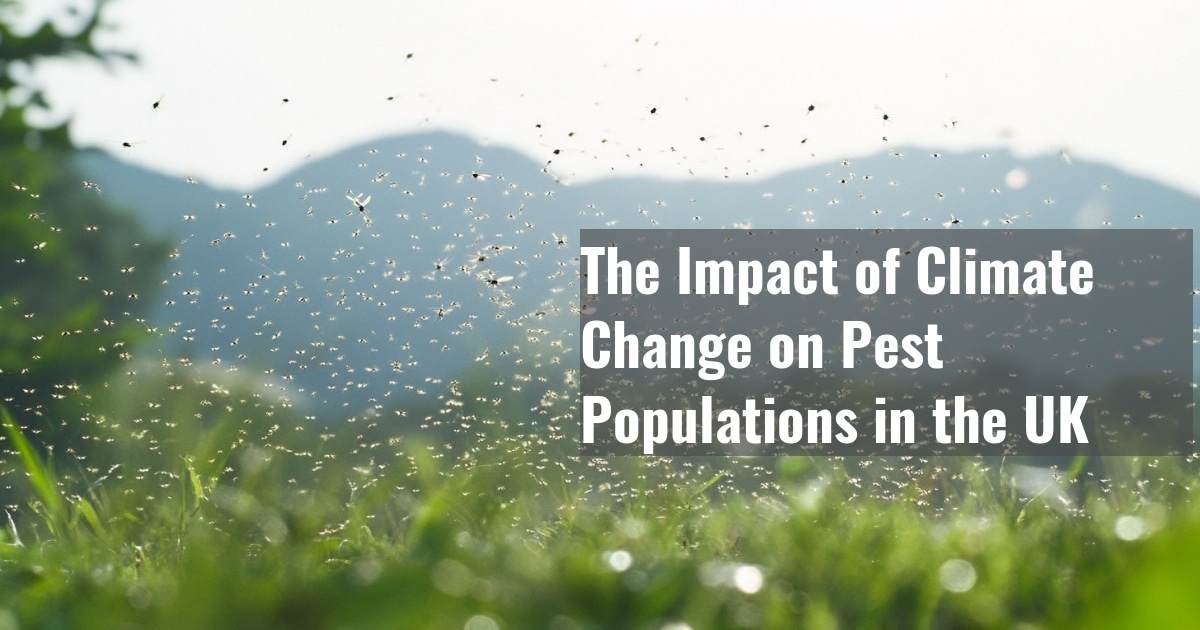
Climate change is a global phenomenon that has far-reaching effects on our ecosystems. As temperatures rise and weather patterns become more extreme, we are witnessing significant changes in the behaviour and distribution of various species, including pests.
In the UK, these changes are becoming increasingly apparent, with certain pest populations thriving and spreading to new territories. This article aims to explore the impact of climate change on pest populations and discuss how pest control strategies are evolving to address these challenges.
Table of Contents
The Effects of Climate Change on Pest Habitats
The changing climate is altering pest habitats in several ways. Increased temperatures and prolonged periods of warm weather are creating favourable conditions for many pest species to survive and reproduce.
Additionally, extreme weather events such as floods and droughts can disrupt natural predator-prey relationships, allowing pest populations to grow unchecked. As a result, pests are expanding their ranges and colonising new areas that were previously inhospitable to them.
Key Pest Species Affected by Climate Change in the UK
Several pest species have become increasingly problematic in the UK due to climate change. One example is the Asian lady beetle, which has benefited from warmer temperatures and milder winters.
These beetles can now survive in greater numbers and spread to new regions, causing damage to crops and invading homes in search of overwintering sites.
Another pest that has taken advantage of the changing climate is the Formosan subterranean termite. These destructive insects have been able to establish populations in the UK as a result of warmer temperatures, posing a serious threat to wooden structures and buildings.
The Asian Tiger Mosquito, a vector for various diseases, has also been expanding its range in the UK due to rising temperatures. Studies have shown that the risk of this mosquito species establishing itself in the country has increased significantly in recent years, raising concerns about potential public health impacts.
Challenges in Pest Control
The changing behaviour and distribution of pests present several challenges for pest control strategies. Traditional methods that rely on historical data and predictable pest cycles may no longer be effective as pests adapt to new conditions.
Pest control professionals must now contend with infestations in previously unaffected areas and deal with pests that have developed resistance to certain treatments.
To address these challenges, pest management strategies need to be adaptive and proactive. This involves closely monitoring pest populations, staying informed about the latest research and trends, and employing a combination of preventive measures and targeted treatments.
Integrated Pest Management (IPM) and Sustainable Practices
Integrated Pest Management (IPM) is an approach that focuses on long-term prevention of pests through a combination of techniques such as biological control, habitat manipulation, and targeted chemical use. This holistic approach is becoming increasingly important in the face of climate change, as it promotes sustainable and environmentally friendly pest control practices.
Strathearn Pest Control has embraced IPM as a core part of their strategy. They work closely with their clients to develop customised pest management plans that prioritise prevention and minimise the use of chemicals. This not only helps to control pest populations effectively but also reduces the environmental impact of pest control activities.
FAQs
What are the main reasons for the increase in pest populations due to climate change?
The main reasons for the increase in pest populations due to climate change are habitat changes and warmer climates. As temperatures rise and weather patterns become more favourable for pests, they are able to survive and reproduce more successfully, leading to population growth and expansion into new areas.
Which pest species are becoming more prevalent in the UK due to climate change?
Some of the pest species that are becoming more prevalent in the UK due to climate change include Asian lady beetles, Formosan subterranean termites, and the Asian Tiger Mosquito. These pests are benefiting from warmer temperatures and milder winters, allowing them to establish populations in areas where they were not previously found.
How is Strathearn Pest Control adapting its services in response to climate change?
Strathearn Pest Control is adapting to the challenges posed by climate change by offering integrated pest management services and rapid response strategies. Their technicians are trained to identify and treat pests that are becoming more prevalent, and they work closely with clients to develop customised, sustainable pest control solutions.
Conclusion
Climate change is having a significant impact on pest populations in the UK, with certain species thriving and expanding their ranges as a result of changing weather patterns and habitat conditions. This presents new challenges for pest control strategies, requiring a more adaptive and proactive approach.
Strathearn Pest Control is leading the way in addressing these challenges, offering comprehensive pest management solutions that are tailored to the evolving needs of their clients. By embracing integrated pest management and sustainable practices, they are helping to control pest populations effectively while minimising environmental impacts.
As the effects of climate change continue to shape our ecosystems, it is more important than ever to work with experienced and knowledgeable pest control professionals. Consulting with Strathearn Pest Control ensures that you have access to reliable, effective, and sustainable pest management solutions, no matter how the landscape of pests may change in the future.
Additional Resources
For professional pest control services tailored to the challenges of climate change, contact us today. Our expert technicians are ready to provide you with rapid, reliable, and sustainable solutions for all your pest management needs.

